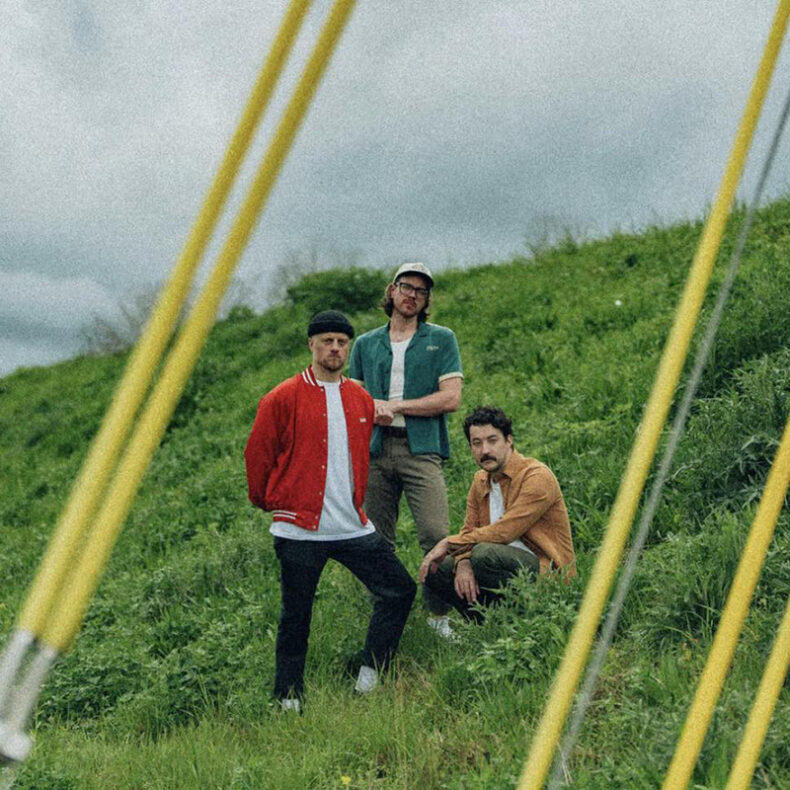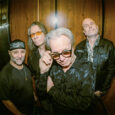FOUR CHORDS AND THE TRUTH
A CONVERSATION WITH MY EPIC
When certain bands experience a reawakening, it can take many different forms, almost like a mini renaissance.
Such developments are relevant to musical experiences as well as personal ones. The seed of creativity dies without personal growth and transformation. Bands like My Epic, a rarity in the scene, have years of experience in their pedigree to make a critical footprint in the indie-alternative genre over the past decade. Yet, despite their non-mainstream approach to their music, bands like My Epic don’t keep making music simply because their creativity depends on their survival. Music is a calling for My Epic, not a job. They were born out of love and dedication, which they have continued to foster over the years. Maybe that adds to the band’s charm and sense of creative boundlessness.
When freed from the constraints of a capitalist system, music becomes an oasis rather than a means of support, and the urge to create art arises naturally as a means of expressing one’s feelings and experiences. Having lived long enough to withstand the bright light of innocence within the honeymoon phase that surfaces at the start of every band’s career, to the period in which those lights somewhat simmer into a muted shade of orange, My Epic has withstood such events and has found joy, peace, and faith in their lives. “That’s a great question, it’s funny because it doesn’t feel that long to me. We have always finished something…there is an old saying, ‘The true reward for good work is that you get to do more, so you better like the work.’ We truly like making the music, and we love the process of collaborating to create something we all feel good about. It’s always been cool to find the people who need it and want it,” says vocalist and guitarist Aaron Stone. “But yeah! So much has changed. The last three records were EPs. We didn’t have the bandwidth and life to make a full record at the time, and an EP was all we could manage to keep making art together. So, I think this time, we knew we were signing a new record deal and it was just time to change a few things. We felt like we were kind of hitting a ceiling. Facedown kind of blessed us and ToothandNail offered us a new opportunity, so it felt like we were making the family bigger, rather than changing teams. This go around, it just felt like it was time to do a full-length. We knew this was going to be hard. We just felt with the last few EPs we were finally hitting the bar we wanted to hit. I mean with every record…I feel like we put 110 percent into it and we are proud of it. When you look far enough back in your catalogue of anything, you’re always embarrassed when you look at the old stuff, because you’re hearing a version of yourself that is over 10 years old. I think with Ultra-Violet and Violence, I feel like those were moments that we were striving for. It was so exciting, and made us feel like, ‘What else can we do to grow and do things a little differently?’ So, we changed a bunch of things on this equation with this record.”
Their latest release, Loriella, is not an album to broadcast the years of experience the band has got on some others in the genre, but a snapshot of a band’s accepted growth and another chapter in the matured act’s life since the release of Behold in 2013. For Aaron Stone, My Epic stands on the shoulders of a very different fourth record after 11 years of distance between their last full-length and the change that has colored the years of their careers. At a time when the band members are enjoying success in their non-musical endeavors, including being full-time parents, Loriella manifested at a precarious moment when it came to finding the time to record an album. While a handful of EPs had piqued the interest of wanting to grow and create something more, building that kind of extended work meant more time, patience, and effort. Loriella stands for the freedom to ultimately produce such a significant effort despite the changes in their lives. “Nate produced it, who’s in the band, and Matt Goldman, is still involved. Nate wanted the ball, which is a superpower we hadn’t been using for the last eight years. It was like having our producer in the band. So, we could spend more time on it. I think this is also saying, ‘Sure I’m very different than I was in 2008, and 2008 had some really great things, but I feel like 2010 was when people really started to know who we were. That was the first time we put out a record and hit a target we were aiming for. I think we have the same integrity in the songwriting, and the way we function as a band, and as people. If people like the level of frankness, honesty, care, and integrity that we have put into every other record, that part hasn’t changed. We are gonna write about the most important stuff, whether that’s easy to say or hard. We aren’t trying to please anyone, we are just chasing the things that are heavy on our hearts, and the things that are exciting to us artistically. So in that sense, I Am Undone and Loriella feel very similar. It does feel like we have been apprenticing, kinda part-time the whole way, and this is the record where we got all the time and the resources to do everything the right way. There is not anything I’m embarrassed by on any of the other records, but this is the first record where we didn’t run into any deadlines. We got to work till the songs felt right and we were ready to put it out. That’s been exciting to see what’s the same and what different for sure.” he smiles.
Even though My Epic had all the tools necessary to record their first full-length album since Behold, returning to the studio presented a whole new set of difficulties. For quite some time, My Epic had not operated as a full-time band. All of the band members’ lives had drastically changed, leaving little room for occasional spurts of creativity for a few songs or touring before returning to their everyday lives. Loriella was not only reuniting them on a full-time basis but also spearheading an extensive project that would build a very different approach and sound for the band. “Yeah, it was daunting…” recalls Aaron Stone. “The last full-length, Behold, was when we were doing the band full-time. I always say, ‘We do the band full-time when we do it, we just don’t do it all the time.’ We’ll go to the studio for a couple of weeks and that will be all we do, or I’ll go on tour, and I’ll carve out time, and I’m going to work on the band Thursday and Friday. I treat it like it is full-time, but not all the time. That was the first full-length after we had gone off the road full-time. We were touring sporadically, and I was working…It was really hard.
Ten songs are infinitely harder than six. That seems like it shouldn’t be, but if you finish the chorus of one song today, and you’re doing ten. You go to bed feeling like nothing really got accomplished. If you finish one song, and there are only four more, you’re like, ’20 percent of the work is done! let’s go to dinner!’ you know, it’s a mental thing.” he laughs. “We put out the three EPs because it was all we had the time for, we thought that was the best way of getting our music out. It won’t come out all at once, but people will get more music if we do smaller batches, and I think that’s true with the way we were living. But things have changed in the last few years. I have more time to do the band. Nate has a bigger integration in the band, and Tanner was really available again on this record.
While everyone loved the EPs, not everyone paid as much attention to them. These days it’s either albums or singles, EPs fall somewhere in between. So, we took the time since we were signed to a new label and COVID happened, so everyone gets to use the COVID card once. I had my first child, Nate had some health stuff, and we were hoping this would come out in late ’21 or 22. We started writing as soon as Violence came out, at the beginning of 2020. In the past, we wrote 80 percent of the record, and we would tell the label and Goldman we were ready. They’d negotiate money between them, we wouldn’t really be involved, and then we would show up at the studio. By that time, we would have a month or two to finish, and we would go into the studio for three weeks, leaning into everybody, working as hard we can with a lot of talented people, and you get what you get. If there are five songs on a record, there will be five that we nailed and one that sounds good and professional but isn’t what we intended. You get near the end, and you think, ‘Oh if I could, I would redo all of this.’ But we just can’t, and it sounds good. Because it’s good quality, you have put it out and trust it, and well the other four songs, you just have to wait forever. This time we hit the reset, we took our time, and we didn’t turn anything in. I could give some examples but there is one song on every record that just didn’t feel right artistically, but we didn’t have the time to scrap it. This time we stripped it down to the four chords and the truth approach. This needs to be as powerful as I am playing it by myself emotionally. It was definitely different and scary to start a full length, but our lives had changed to make it possible, and it felt like it was time.”
Throughout such an atypical and intimidating process, Loriella details the passing of time and the loss of innocence that manifests in its presence. But even with such loss, we learn to find love, joy, and acceptance in who we are and what we are becoming. Despite the struggles, there is beauty in seeing the world with a new set of eyes; even if parts of you have been lost in that process, there is beauty in renewal. We can always let those changes and difficult experiences make us into something sinister and ugly, but Loriella says something more about going in a different direction. There is always a better path, and Aaron Stone hopes others find the same. “I still feel like I am 17 and still trying to write,” he smiles. “Even today, I was practicing for a studio thing, I found a new riff and getting excited as I was when I was 15. This wasn’t a concept record. It was a vibe, and I knew where my life was headed. I am always writing songs for myself and my closest people first that I need to help me get through. I’ve been through enough trials in my life, plenty of which are my fault, to understand why people become so cynical. This isn’t to shame anyone, I think it’s a fair assessment of the data if your life has been rough, I get it, that’s how the math adds up. But I think it’s basically agreeing to die early. It’s like letting the hopeful part of you die, and it’s only a matter of time. This is all concurrent to the writing, I’m okay with being critical, it’s okay to call out things, but I don’t like my views to be so negative all the time. This record is about as much as you can find hope and joy in the dark, there is always a turnaround.”










